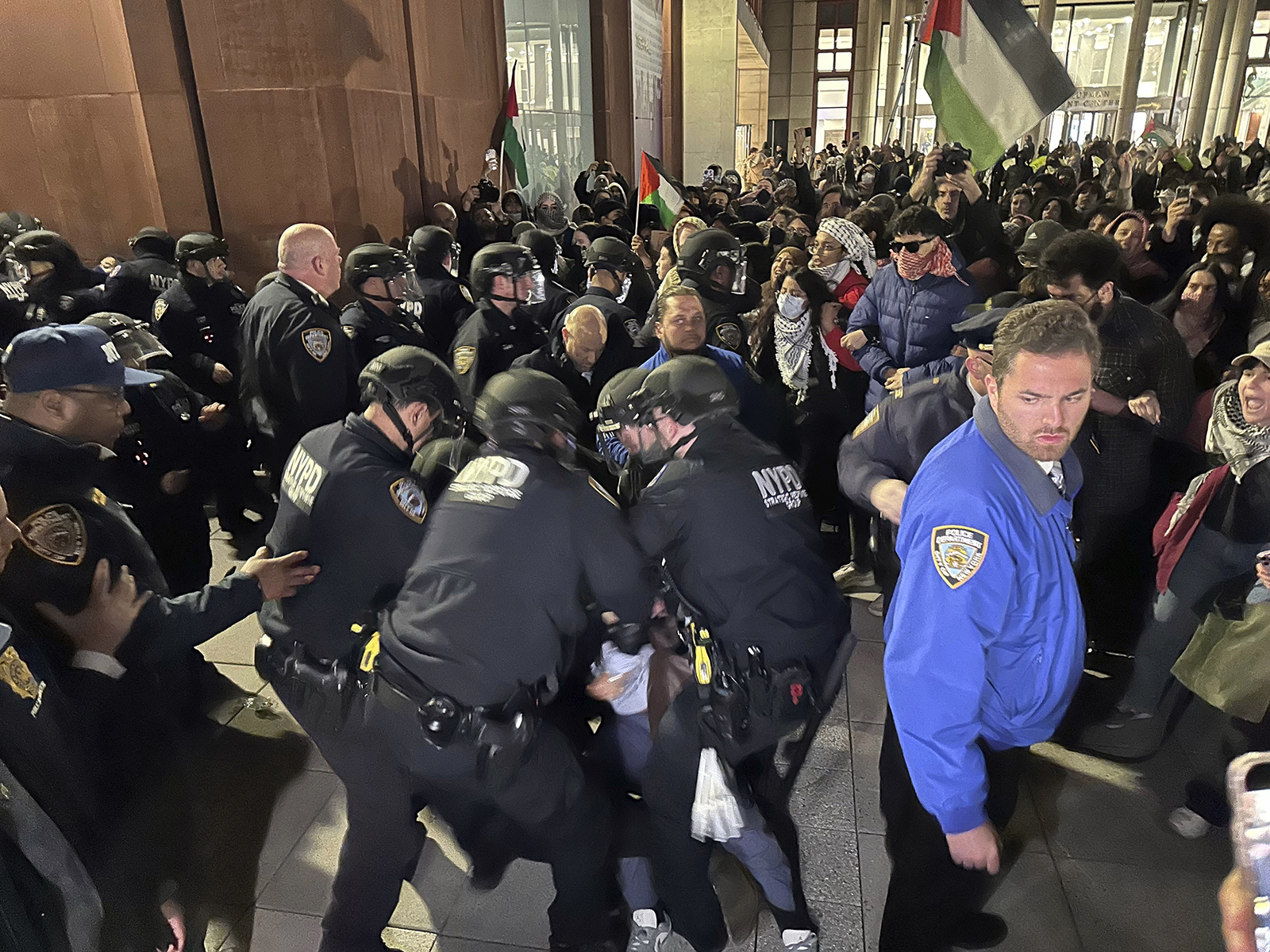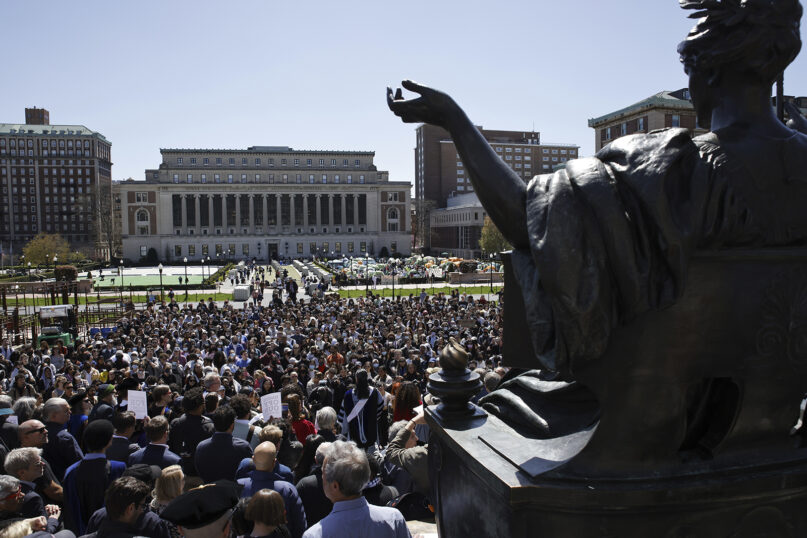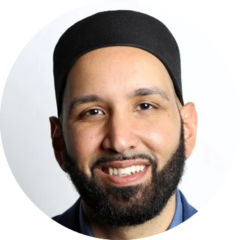(RNS) — We are witnessing a watershed moment in student activism for Palestinian human rights. Students are effectively mobilizing on their respective campuses to demand an end to their universities’ complicity in the genocide in Gaza, the seven-decades-long and ever-expanding Israeli occupation of Palestinian land and an Israeli system of apartheid against the Palestinian people.
Many have successfully passed referendums calling on their administrations to divest financially from Israel in various forms, including at some of the largest universities in the country, like the University of Michigan, Rutgers University, University of California-Davis, the University of Illinois at Urbana-Champaign and many others.
Just this week, students at Columbia College in Manhattan voted to divest financially from Israel, cancel Columbia’s Tel Aviv Global Center and end Columbia’s dual degree program with Tel Aviv University. And it’s not the first time students at Columbia have passed a divestment resolution.
In 2020, students voted in favor of divestment, with fewer students participating in those elections. In response to its passing in 2020, then-President Lee Bollinger shut down any hope that the university would act upon the election results, stating that “the University should not change its investment policies on the basis of particular views about a complex policy issue.”
If the decades-long occupation was complex, the ongoing genocide has simplified the equation, one in which more than 34,000 Palestinians have been killed, including more than 25,000 Palestinian women and children, according to U.S. Secretary of Defense Lloyd Austin. The genocide has made the translucent transparent, exposing the reality of U.S. complicity in the slaughter of Gaza. Just this week, mass graves were unearthed next to Al-Nasser and Al-Shifa hospitals, revealing hundreds of bodies and evidence of mass executions committed by the Israel Defense Forces.
Meanwhile, mainly mainstream media outlets continue to push the specter of a dangerous binary on U.S. campuses: angry pro-Palestinian protesters versus unsafe Jewish students. This is a gross and purposeful mischaracterization and further trivializes the threat of real antisemitism.
As Dave Zirin of The Nation put it, this is the greatest disservice to the Jewish people. “Anyone who attempts to fasten a 5,000-year-old religion to a 150-year-old colonial project is guilty of antisemitism. They are pushing the idea that my family, merely because of our religion, supports war crimes abroad and the crackdown on critics at home.”
I noted recently in an interview on the “Lex Fridman Podcast” that some of the fringe voices are unknown to protest organizers and are often undercover provocateurs. Shirion Collective, a pro-Israel “surveillance” group, announced a campaign on X and elsewhere to infiltrate pro-Palestinian protests, offering payments to those with a “Middle Eastern appearance” and willing to wear kaffiyehs to blend into protests for “deeper infiltration.”
That prompted Laila Al-Arian, executive producer of Al Jazeera’s “Fault Lines,” to opine, “Journalists, do your jobs.”
A Jewish student at Columbia, Jonathan Ben-Menachem, warned against the image university officials and the media are painting of antisemitic threats. “The most pressing threats to our safety as Jewish students do not come from tents on campus,” he wrote. “Instead, they come from the Columbia administration inviting police on to campus, certain faculty members, and third-party organizations that dox undergraduates” (referring to the practice of revealing people’s location or personal information).
Other, more isolated incidents point to the presence of real antisemitic voices at some protests, and hateful words are always condemnable. But they should not be projected upon the vast majority of the movement, nor should they overshadow the urgency of what brought students out.
This sentiment also ignores that Jewish protesters and organizations like IfNotNow and Jewish Voice for Peace have been on the front lines in protesting the genocide in Gaza, as well as the front lines of resistance against the occupation and apartheid for decades prior to Oct. 7, 2023. Anti-Zionist Jewish voices have effectively been silenced.
Simone Zimmerman, co-founder of IfNotNow, a movement of American Jews organizing to end U.S. support for Israel’s apartheid system, highlighted this erasure in a post on X. “As the White House, Jake Tapper, ADL (the Anti-Defamation League), AJC (the American Jewish Committee), etc. release alarmist statements about Jewish students, they made no mention of the Jews who were made homeless this week by Columbia, left out in the cold literally [and] figuratively on Shabbat, and now on Passover because of their politics.”

New York City Police Department officers arrest pro-Palestinian protesters outside a student-led encampment at New York University on Monday night, April 22, 2024, in New York. The protest and encampment was set up to demand the university divest from weapons manufacturers and the Israeli government. (AP Photo/Noreen Nasir)
Ultimately, the media’s coverage seeks to squash a palpable shift in American public opinion on Israel as it carries out mass slaughter, all disguised as a genuine care for Jewish students’ safety on campuses across the country.
It was students and their professors on college campuses across the country who led the charge in anti-Vietnam war protests and teach-ins. Now, pro-Palestine encampments on university grounds are being utilized as a form of protest, and university administrations are cracking down hard. Just today (April 23), nine students at the University of Minnesota were arrested after an anti-genocide encampment was shut down by police. This week alone, hundreds of protesters were arrested and encampments destroyed on multiple campuses, including at New York University and Yale University.
Layla Hedroug, one of the students arrested on Yale’s campus this past weekend, described voluntary arrest as a privilege. “I couldn’t help but think of the Palestinians who don’t have the same luxury or privilege to be given the opportunity to voluntarily get themselves arrested. There’s no due process in the West Bank. There are people who are wrongfully imprisoned for years at a time. Our arrests were done with the intention of bringing attention to Gaza. That is why we’re here.”
The genocide has exacerbated a deepening polarization between younger and older generations of Americans on the Israeli occupation and Palestinian human rights. According to Pew survey results just last month, a plurality of Democrats opposed providing Israel with military aid, while a plurality favored providing only humanitarian aid to Gaza. Arguably most striking, “38% of adults under 30 supported only humanitarian aid for Palestinian civilians, compared with 6% who supported only military aid for Israel.”
On campus at Columbia, IDF reservists sit in classrooms alongside Palestinian students. In Manhattan, they’re classmates. In Hebron, the Palestinians are subject to apartheid.
With their ongoing efforts, whether they recognize it yet or not, student activists at Columbia may have opened the floodgates for the normalization of widespread institutional boycott, divestment and sanction of Israel.
Columbia’s students have a long history of protesting injustice, including the Vietnam War protests in 1968 and anti-apartheid protests in 1984. On its official website, Columbia regrets its crackdown on the anti-war protests of 1968. “Columbia is a far different place today than it was in the spring of 1968 when protesters took over University buildings amid discontent about the Vietnam War (and) racism. … New York City Police stormed the campus and arrested more than 700 people. The fallout dogged Columbia for years. It took the university decades to recover from those turbulent times.”
As your students illustrate their frustration and discontent once more, do not make the same mistake again.






